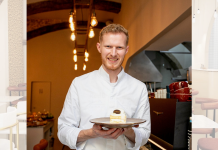Karen Dunn can tell a honey bee from a solitary bee just from the sound its wings make in flight. It sounds like a superpower, but as a beekeeper, it’s all in a day’s work for her.
There’s not much Karen can’t tell you about bees. “I just love them,” she enthuses. “They’ve been on this planet much longer than we have, and their adaptations, lifecycles and societies are fascinating. There are so many lessons they can teach us, and there’s still so much to discover about them. When I have the pleasure of just sitting and patiently waiting to photograph a solitary bee, time slows down. It’s very meditative.”
For all its intensity, her interest is a fairly new development. It was only in 2016 – after years of a successful career in marketing at a business consultancy – that Karen introduced hives to her garden. This came about by accident. She explains that she was helping her mother, Linda, on a mining project when she meet Ata Mkhwanazi, who was a passionate beekeeper. “Ata was our partner in the project, and we got to know him well during all our long drives out to the mining property. During one of our lengthy conversations, he told us how his interest in beekeeping had been sparked while he was a prisoner on Robben Island. He noticed a peach tree that never bore any fruit, and when he asked the wardens about this, they pointed out that there were no bees on the island, and so the tree couldn’t be pollinated. That stuck with Ata … years later, when he was released, he started keeping hives so that he could encourage pollination.”
The family didn’t give Ata’s pastime much thought until Linda found that her pool pump was playing host to a colony of bees. Ata offered to remove the bees – but when he saw her garden, with its wealth of forage and water, he became very excited about its potential as a permanent home for them. He convinced her to let him place one of his old, empty hives in the garden, and within a few weeks, a swarm had moved in.
That was the first step on Karen’s journey to establishing her award-winning honey label, Urban Apiary. The next nudge also came about serendipitously when Ata broke his wrist helping to remove a hive from the car port at her house, where it had been placed. With harvest season around the corner, Ata’s incapacitation was thoroughly inconvenient – so he handed his hives over to Karen and her partner, Rob.
Although Karen’s study of zoology points to her long-standing interest in nature, she had never before considered becoming a beekeeper. Granted, she, Linda and Rob had played their part in extracting honey from Ata’s hives on occasion, but now, they were about to enter a very sticky situation – quite literally!
Karen and Rob quickly invested in all the equipment they’d need to look after the hives safely, and added some new ones for good measure. Of course, taking the endeavour to the next level meant new expenses – which is why they decided to start selling their honey, which they’d previously given away.
The timing couldn’t have been better. It was 2018 and The Pantry Market was about to launch in Keyes Avenue, Rosebank. Karen approached the organisers, but was told that, regretfully, a honey vendor had already been signed up. Karen explained that her honey was not only raw, and therefore brimming with all the enzymes and anti-oxidants that make it such a health powerhouse, it was also locally produced from gardens in Houghton and Melville. That swayed the organisers, and Urban Apiary had its first official space to sell. One year later, demand for the honey had grown to such an extent that Karen and Rob opened a little shop at Rand Steam Shopping Centre – but, sadly, the Covid pandemic put too much pressure on trade. Although Karen continued to maintain her hives, her honey became something of an inner circle secret, sold to loyal fans on demand.
It was a small market at her son’s school that reawakened her entrepreneurial spirit and reminded her how much she missed face-to-face customer engagement. Encouraged by the enthusiastic feedback she received for a product, which is clearly superior to any of the jars available on supermarket shelves, Karen has recently launched a honey subscription which allows customers to sign up to receive a certain number of jars, to be delivered, every month. Subscribers will have first dibs on the seasonal Joburg honey harvest and will be able to sample different varieties of honey, too. Moving beyond honey, Karen and Rob have dabbled in a range of meads, the perfect sip for a summer’s evening.
She’s also working on creating a bee experience at her home, welcoming honey box subscribers to her honey studio for talks about bees, honey harvest and other related topics. At the same time, Karen is keen to direct people’s interests to bees beyond the little workers that give us honey. “Most people think only of the yellow and black striped girls, but we have more than 1000 species that help with the essential task of pollination,” she says. She’s developing a range of bee hotels that can be hung in the garden as a home for these solitary bees, while also working on a range of seasonal pollinator plant gardening boxes, full of plants that attract these bees to gardens, and intends to introduce garden consulting and design to help people who share her desire to make their homes more pollinator friendly.
Details: Instagram.com/urbanapiary, [email protected]

Caption for Karen honey photo: Karen’s local Melville Urban Apiary raw honey. Subscribe through urbanapiary.co.za for three month (R450) or six month (R870). There’s door-to-door delivery for Melville and Craighall residents, and if you stay further away, Pudo delivery can be arranged.

Karen’s favourite plants for pollinators
Indigenous plants: Pink perennial basil, plectranthus and Cape forget-me-not
Exotic plants: Pride of madeira, Mexican safe and butterfly bush
Herbs: Borage, Mexican tarragon and bee balm
Indigenous trees: Wild peach, pink wild pear and cheesewood
Exotic trees: Tree dahlia, tree fuchsia and cherry tree
Text: LISA WITEPSKI • Photo: Nicole Moore. Details: nicolemoorephotography.co.za • Make-up artist: Erin GILL. Details: Follow @erin_sa on Instagram.






